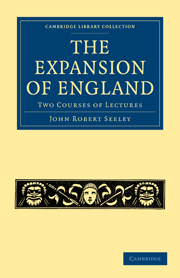Book contents
- Frontmatter
- PREFACE
- Contents
- COURSE I
- LECTURE I TENDENCY IN ENGLISH HISTORY
- LECTURE II ENGLAND IN THE EIGHTEENTH CENTURY
- LECTURE III THE EMPIRE
- LECTURE IV THE OLD COLONIAL SYSTEM
- LECTURE V EFFECT OF THE NEW WORLD ON THE OLD
- LECTURE VI COMMERCE AND WAR
- LECTURE VII PHASES OF EXPANSION
- LECTURE VIII SCHISM IN GREATER BRITAIN
- COURSE II
LECTURE VII - PHASES OF EXPANSION
Published online by Cambridge University Press: 05 August 2011
- Frontmatter
- PREFACE
- Contents
- COURSE I
- LECTURE I TENDENCY IN ENGLISH HISTORY
- LECTURE II ENGLAND IN THE EIGHTEENTH CENTURY
- LECTURE III THE EMPIRE
- LECTURE IV THE OLD COLONIAL SYSTEM
- LECTURE V EFFECT OF THE NEW WORLD ON THE OLD
- LECTURE VI COMMERCE AND WAR
- LECTURE VII PHASES OF EXPANSION
- LECTURE VIII SCHISM IN GREATER BRITAIN
- COURSE II
Summary
The object I professed to set before myself in these lectures was to present English history to you in such a light that the interest of it instead of gradually diminishing should go on increasing to the close. You will perceive by this time in what way I hope to do this. It is impossible that the history of any state can be interesting unless it exhibits some sort of development. Political life that is uniform has no history, however prosperous it may be. Now it appears to me that English historians fail in the later periods of England because they have traced one great development to its completion and do not perceive that, if they would advance further, they must look out for some other development. More or less consciously they have always before their minds the idea of constitutional liberty. This idea suffices until they reach the Revolution of 1688, perhaps even until they reach the accession of the House of Brunswick. But after this it fails them. Not that development ceases in the English Constitution at that point, nor even that to the political student it becomes less interesting. But it begins to be gradual and quiet; the tension is relaxed; dramatic incident henceforth must be looked for elsewhere. Our historians are not sufficiently alive to this. It may be true that George III.'s use of royal influence attained in an insidious way objects similar to those which the Stuarts tried to reach by prerogative or by military force.
- Type
- Chapter
- Information
- The Expansion of EnglandTwo Courses of Lectures, pp. 119 - 140Publisher: Cambridge University PressPrint publication year: 2010First published in: 1883



